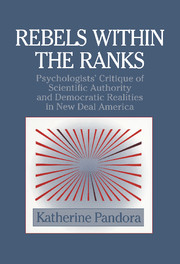 Rebels within the Ranks
Rebels within the Ranks Published online by Cambridge University Press: 06 October 2009
Pay no attention to the man behind the curtain!
The Wizard of Oz (1939)In elaborating the “social” half of the-individual-in-social-context construct, Allport and the Murphys sanctioned crossing beyond the confines of scientific propriety into the realm of “impure” science – “impure” that is, by the definition of scientists who sought to cleanse science of the taint of the social in their quest to obtain “pure” knowledge. As students of the “common public world of nature,” Allport and the Murphys, on the other hand, assumed that their endeavor was indeed a social enterprise, and that science was, as a result, shot through with moral and political values. As researchers, they believed that neither they nor their colleagues could – or should – sidestep confronting questions regarding the place of scientific elites in a democracy by hiding behind a veil of “objectivity.”
As Allport and the Murphys conceived it, one of their duties as social psychologists was to insist that the antidemocratic social structures of American life be identified and forthrightly examined – so as to discharge their public obligations as scientists working in a democracy, but also in order to chart the terrain in which they themselves, as scientists, labored. They fully expected that “impure” science, done properly, would be regarded as “dangerous” and “subversive” by those in positions of economic power, as Gardner Murphy maintained in his 1938 speech as chairman of the Society for the Psychological Study of Social Issues (SPSSI). Murphy's warning to psychologists that they must take responsibility to see that their “factual discoveries” were not placed in the service of the “exploitation of some by others” signaled the existence of a dissenting viewpoint that questioned the democratic pretensions of scientific practice.
To save this book to your Kindle, first ensure [email protected] is added to your Approved Personal Document E-mail List under your Personal Document Settings on the Manage Your Content and Devices page of your Amazon account. Then enter the ‘name’ part of your Kindle email address below. Find out more about saving to your Kindle.
Note you can select to save to either the @free.kindle.com or @kindle.com variations. ‘@free.kindle.com’ emails are free but can only be saved to your device when it is connected to wi-fi. ‘@kindle.com’ emails can be delivered even when you are not connected to wi-fi, but note that service fees apply.
Find out more about the Kindle Personal Document Service.
To save content items to your account, please confirm that you agree to abide by our usage policies. If this is the first time you use this feature, you will be asked to authorise Cambridge Core to connect with your account. Find out more about saving content to Dropbox.
To save content items to your account, please confirm that you agree to abide by our usage policies. If this is the first time you use this feature, you will be asked to authorise Cambridge Core to connect with your account. Find out more about saving content to Google Drive.